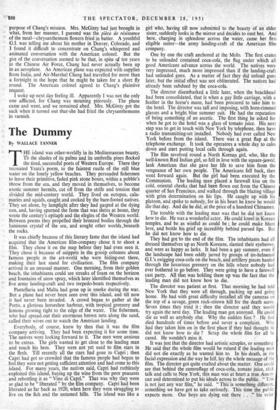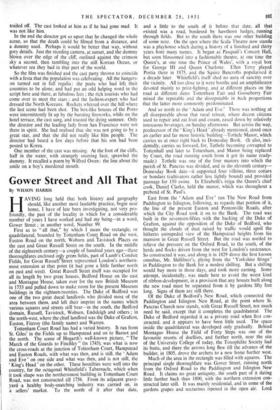The Dummy
Ey WALLACE TANNER
THE island was other-worldly in its Mediterranean beauty. TO the shades of its palms and its umbrella pines flocked the fired, successful poets of Western Europe. There they recreated Yeats's poem, to the faintest rustle of the still blue water on the lonely yellow beaches. They persuaded fishermen to leave their primitive, faded pink stone boxes, within a pebble's 'throw from the sea, and they moved in themselves, to become exotic summer hermits, cut off from the strife and tension that divided the mid-century world. They lived on octopus, cala- maries and squids, caught and cooked by the bare-footed natives. They sat alone, by lamplight after they had gasped at the dying Sun, and, having spurned the fame that was theirs at home, they wrote the century's epitaph and the elegies of the Western world. Between poems they propelled their bronzed bodies through the luminous crystal' of the sea, and sought other worlds ,beneath the rocks.
It was chiefly because of this literary fame that the island had acquired that the American film-company chose it to shoot a film. They chose it on the map before they had even seen it. They chose it because of snippets in the gossip columns about famous people in the art-world who were hiding-out there, making their last stand for civilisation. The film company arrived in an unusual manner. One morning, from their golden beach, the inhabitants could see streaks of foam on the horizon and fountains of snow spray, which later identified themselves as five army landing-craft and two torpedo-boats tespectively.
Pantellaria and Malta had gone up in smoke during the war. But a plane had never been seen over this island, and till now it had never been invaded. A crowd began to gather at the Porto, a glorious horseshoe harbour, with tropical greenery and lemons growing right to the edge of the water. The fishermen, Who had spread.out their enormous brown nets along the sand, called their wives out to watch the American landing. .
Everybody: of course, knew by then that it was the film company arriving. They had been expecting it for some time. The natives were looking forward to it. The men were anxious to be extras. The girls wanted to- get close to the leading man and touch his hem. They were not yet used to film stars in the flesh. Till recently all the stars had gone to Capri ; then Capri had got so crowded that the famous people had begun to feel they were not getting sufficient attention and had come to this island. For many. years, the natives said, Capri had _ruthlessly exploited this island, buying up the wine from the poor peasants and rebottling it as "Vino di Capri." That was why they were so glad to be " liberated " by the Mm company. Capri had been liberated as far back as 1920, when here they were struggling to live on the fish and the untamed bills. The island was like a girl who, having till now 'submitted to the beauty of an elder sister, suddenly looks in the mirror and decides to oust her. And here, charging in splendour across the water, came her first eligible suitor—the army landing-craft of the American film company.
One by one the craft anchored at the Mob. The first crates to be unloaded t ontained coca-cola, the flag under which all good Americans advance across the world. The natives were very impressed, much more impressed than if the landing-craft had unloaded guns. As a matter, of fact they did unload guns later, but the initial effect was not obliterated. The natives had already been subdued by the coca-cola.
The director disembarked a little later, when the beachhead had been consolidated, that is when a gay little carriage, with a feather in the horse's mane, had 'been procured to take him to the hotel. The clifector was tall and imposing, with horn-rimmed glasses and a bright blue summer suit. He had the reputation of being something of an ascetic. The first thing* asked for when he got to the hotel was .a glass of tomato juice. His next step was to get in touch with New York by telephone, then have a radio transmitting-set installed. Nobody had ever called New York before from the island. There was a great flap at the telephone exchange. It took the operators a whole day to calm clown and start putting local calls through again.
The film revolved round a North Korean girl, who, like the well-known Red Indian girl, so fell in love with the square-jawed, lank American that she gave her life to save him from the vengeance of her own people. The Americans fell back, then went forward again. But the girl had been executed by the Communists. The leading man placed a farewell kiss on the cold, oriental cheeks that had been flown out from the Chinese quarter of San Francisco, and walked through the blazing village with grim determination on his lips. He caught up with his platoon, and spoke to nobody, for in his -heart he knew he would die that day. And die he did, at the price of a hundred Chinamen.
The trouble with'-the leading man was that he did not know how to die. He was a wonderful actor. He could kneel in"Korean temples, and be as wistful as could be ; he could make blunt love, and bottle his grief up incredibly behind pursed lips. But he did not know how to die.
They had got to the end of the film. The inhabitants had all dressed themselves pp as North Koreans, slanted their eyebrows, and were as happy as larks. It had been a gay summer, even if the landscape had been oddly jarred by groups of tin-helmeted G.I.'s swigging coca-cola on the beach, and artillery pieces hauled through the luxurious greenery on the hills where nobody had ever bothered to go before. They were going to have a farewell cast party. All that was holding them up was the fact that the leading man did not know how to die. . - . The director was patient at first. That morning , he had told New York that they were all through, packing up and going home. He had with great difficulty installed all the cameras on the top of a savage, green rock-strewn hill for the death scene. Seven times they tried it ; then the director said they would try again the next day. The leading man got annoyed. He could die as well as anybody else. Why the sudden fuss ? He had died hundreds of times before and never a complaint. Why had they taken him on in the first place if they had thought he did not know how to die ? Scrap the whole film for all he cared. He wouldn't miss it.
It was just that the director had artistic scruples, or something. He said that the whole film would be ruined if the leading man did not die exactly as he wanted him to. In his-death, in the facial expression and the way befell, lay the whole message' of the film. The director got quite exalted about the matter. One could see that behind the camouflage of coca-cola, tomato juice, slick talk and calls to New York, this man was at heart a true Ameri- can and determined toput his ideals across to the public. " This is not just any war film.," he said. "This is something different, something-we have got to take seriously. This time the public expects more. Our boys are dying out there . . ." his voice trailed off. The cast looked at him as if he had gone mad. It was not like him.
In the end the director got so upset that he changed the whole scene, so that the death could be filmed from a distance, and a dummy used. Perhaps it would be better that way, without gory details. Just the receding camera, at sunset, and the dummy blown over the edge of the cliff, outlined against the crimson sky a second, then tumbling into the still Korean Ocean, or whatever sea they had in that part of the world.
So the film was finished and the cast party thrown to coincide with a festa that the population was celebrating. All the hangers- on turned out in full regalia : the poets who had left their countries to be alone, and had put an odd helping word in the script here and there, at fabulous fees ; the rich tourists who had come over to meet the stars ; and the fashion-expert who had dressed the North Koreans. Rockets whizzed over the hill where the last scene had been shot. The box-like houses of the Porto were intermittently lit up by the bursting fireworks, While on the hotel terrace, the cast sang, and toasted the dying summer. Only the director and the leading lady from San Francisco were not there in spirit. She had realised that she was not going to be a great star, and that she did not really like film people. The director had heard a few days before that his son had been posted to Korea.
One member of the cast was missing. At the foot of the cliffs, half in the water, with strangely sneering face, sprawled the dummy. It recalled a poem by Wilfred Owen: the line about the smile on a boy's murdered mouth.































 Previous page
Previous page